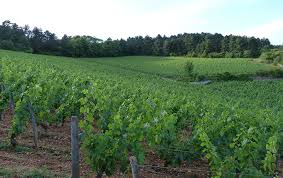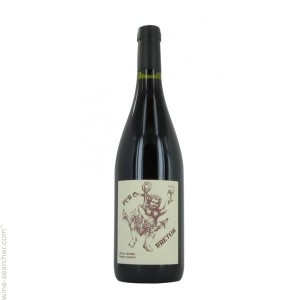I’ve already written about the well-known Loire winery, Domaine Huet, barring two English journalists from tasting its wines at a public event; now my attention has been turned to two producers who have fallen foul of the French authorities.

M. Emmanuel Giboulot of the eponymous Domaine in Burgundy, is facing a fine of up to €30 000 and a possible spell in prison, for failing to spray his vines! He was ordered by a local authority to use insecticide to protect against flavescence doree, one of a group of diseases in which tiny organisms kill young vines and render older ones uneconomical. According to the Oxford Companion to Wine, there’s no known control for it, although leafhoppers, a vector, are presumably what the local authority wanted farmers to spray against.
But M. Giboulot farms biodynamically, as has his family for the past 40 years; not only would spraying be counteractive to that practice, but kill bees and other insects that are crucial to the diversity of the eco-system.
A verdict is due 7th April.
Given the particular ownership set up of Burgundy, where a single vineyard may have several producers owning a couple of rows, I’ve always wondered how credible organic or biodynamic farming is, when your neighbour a metre away chooses to use pesticides. But that’s another matter.
I seem to remember reading one comment M Giboulot made in his defence at the hearing which alluded to vines farmed biodynamically being stronger and more naturally resistant to disease than those grown conventionally. An interesting point that I checked with Johan Reyneke.
Reyneke referred to information given to him by Dr Uwe Hoffman from Geisenheim University. Apparently by building humus levels in the soil to 5%, vines’ natural resistance against disease increases three fold. Because organic and biodynamic practices encourages microbial activity with plenty of organic matter for the microbes to convert to humus, such humus build up is more likely than on land farmed conventionally. Greater diversity in the eco-system is also a stabiliser. There are other pointers which Reyneke doesn’t mention but he concludes ‘I think one could deduce that vineyards farmed organically and/or biodynamically are indeed more stable and resistant to disease than those farmed conventionally.’
From this end of Africa, I find it very odd that a wine farmer is prosecuted for refusing to spray his vines. A few years ago a farmer, somewhere in the Swartland, was, if not prosecuted, severely criticised for spraying too enthusiastically.
But the main point for me here is that the French have an authority which can order how a farmer should treat his vines, at least in regard to preventative sprays.
What we know very much better is that the French AOC system has strict rules about which vines can be planted where, pruning, yield and even start of harvest.
So it’s less surprising that M Olivier Cousin (both bearded and biodynamic) is feeling the might of the INAO (Institut National des Appellations d’Origine) for using the Loire AOC term ‘Anjou’ on his labels, even though he quit the appellation, believing it no longer reflected a guarantee of quality; M Cousin also claims it contributes to polluting the environment through, according to a local newspaper, giving permission for the use of around 134 chemicals.
 Not only has he illegally used the Anjou name on his cabernet franc, labelling it Anjou Pur Breton (Breton is a synonym for cab franc in his part of the Loire), but he has poked fun at the appellation system by putting ‘Appellation Olivier Cousin’ on his cases.
Not only has he illegally used the Anjou name on his cabernet franc, labelling it Anjou Pur Breton (Breton is a synonym for cab franc in his part of the Loire), but he has poked fun at the appellation system by putting ‘Appellation Olivier Cousin’ on his cases.
M Cousin appears on the label in all his hirsute glory, sitting astride an anchor bunches of grapes strategically placed and a raised goblet of wine that could be interpreted as ‘santé’ or something a little less polite to the INAO!
In this case, according to Decanter’s website, M Cousin is facing a potential fine of €5000, somewhat less than M Giboulot, which tells you something about the different levels of misdemeanour in the INAO’s eyes.
I should point out both gentlemen have enthusiastic bands of supporters.
My feelings, not on just these cases but more generally, are as follows: since the first appellation rules were first introduced in Chateauneuf-du-Pape in 1936, much has changed, including today’s younger generation that is much less parochial than their grandparents or parents; they travel and work in other parts of the wine world, where they experience far fewer restrictions. One can understand rising tensions between them and an inflexible INAO. Inflexibility and apparently not listening to those with whom they should enjoy a symbiotic relationship to promote quality from their region would seem ill-advised given a changing and falling customer base and climate. Adapt or die and survival of the fittest are appropriate phrases for the authorities to consider.
That sentiment doesn’t apply only to traditional wine-producing countries. Even with our less restrictive regulations here, we also need to be aware of changes that will help drive our wines forward in quality and customer appreciation.
The Wine and Spirit Board did succumb to pressure from Riesling producers, via their Just Riesling group, and others, including journalists, to allow that name on labels without the qualifiers Rhine or Weisser, but we’re still stuck with Cape Riesling – no doubt due to Distell’s own vested interests.
The various producer interest groups, such as Just Riesling, offer a good, influential body when lobbying is necessary, but it’s really up to all of us who love wine and have a stake in South Africa’s ongoing success that occurrences such as have happened in France do not take place here.
Without knowing the case, I would imagine that the vigneron is being prosecuted because his failure to use preventive measures was putting the whole community of vines at risk, in the eyes of the authorities which are presumably charged with combatting the disease. Precisely because, as you say, vines of different owners are close to each other. This would seem fair enough to me. Given the comparative prevalence of biodynamic beliefs in Burgundy, I wonder if there were others in the area who did agree to spray, for the good of the area as a whole.
There must’ve been other pests and diseases threatening the area over the past 40 years, without M Giboulot’s biodynamic practice of non-spraying bringing down the rest of Burgundy with him and, anyway, if I remember correctly the leafhopper vector was nowhere near the area when the instruction to spray was issued. But what is not made clear is whether M Giboulot has recourse to any biodynamic preparation that will repel the leafhopper. See also Jim Budd’s comment below regarding the support M Giboulot has received.
There is an organic spray but it is more noxious than the non-organic one. Giboulot was charged for not buying the spray as the agricultural authority has been satisified with receipts showing that the required product has been purchased. As far as I know there have been no checks as to whether the product has been applied.
Will indeed be interesting to see what the verdict is on 7th April as well as that on Olivier Cousin due on 7th June.
‘Oh my goodness’ to both pieces of information. An organic spray more noxious than non-organic is surely an oxymoron, while merely having to show receipts of purchase of the required product rather than having used it is somewhat hypocritical on the part of the authorities
Angela. Good post. You correctly say that Emmanuel Giboulot was facing a fine of up to €30,000 and six months in prison but the prosecution has only asked for a fine of 1000€ with 500€ suspended. Had the prosecution always intended to ask for a small fine or did they change their mind in view of the outcry and publicity. A petition in suport of Giboulot got over 500,000 signatures in about 10 days.
Thanks for the comment and update, Jim. Very interesting that the prosecution has asked for a very much reduced fine, with half suspended, to the one M Giboulot was originally facing. I look forward to seeing the outcome.
It’s not unprecedented to claim that an organic treatment is potentially more dangerous than a “chemical” one. The current issue of World of Fine Wine has a (rather eccentric) article suggesting some real problems with the organic approach.